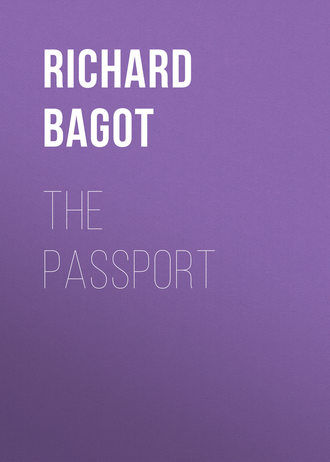 полная версия
полная версияThe Passport
The Abbé Roux had apparently been as good as his word when he declared that he would cause all Rome to learn that Donna Bianca Acorari had compromised herself by receiving, unknown to her relatives, the addresses of a young man. Carefully veiled paragraphs had even appeared in various Roman journals of the second rank, in which the clandestine love-affair between the only daughter and last representative of a princely house and the son of a well-known senator and scientist was mysteriously hinted at. It did not need any great knowledge of the world to realize what would infallibly be whispered were a marriage between Donna Bianca Acorari and Silvio Rossano to be celebrated too speedily.
Silvio himself had been the first to see the wisdom of allowing twelve months to expire before Bianca should become his wife; and he, no less than his father, had no desire to be supposed to be over anxious for the alliance on account of its worldly advantages.
And so everything had been arranged satisfactorily for all the parties chiefly concerned. Bianca herself, now that opposition to her engagement was withdrawn, was quite content to listen to the advice of those round her, especially as Silvio pointed out to her the wisdom of delay. After the uncertainty of the past, the assurance that in a short year they would be united for the remainder of their lives had seemed almost too good to be true.
And the months had sped quickly enough. Silvio had pursued his profession, and had won for himself an increased reputation; and Bianca Acorari and the princess had been happier together than they had ever been before, passing the time between Montefiano and the Villa Acorari near Velletri, and visiting only at rare intervals the old palace in Rome. Bianca had developed a great affection for her home at Montefiano; and, much to the satisfaction of the population, the castle had been gradually refurnished and put in order, and she had announced her intention of making it her almost constant residence in future. Afterwards, when she and Silvio were married, the princess dowager would occupy an apartment in Palazzo Acorari at Rome, and, if she so chose, the villa at Velletri, to both of which she had a right for her lifetime. She and her brother, Baron d'Antin, had already decided that they would live together until such time as Monsieur d'Antin should elect to return to his native country.
A day or two before their wedding, Bianca had received a letter from Monsieur d'Antin. It was a gay letter, full of congratulations and airy trifles, but containing not even the most indirect allusion to the past. Monsieur d'Antin was vexed beyond words – he assured his dear niece – that he would be unable to interrupt the course of his baths at Aix, and thus be present at her wedding; but the pores of his skin being now well opened, it would be absolutely dangerous to travel so far. Bianca showed the note to Silvio, who laughed and said nothing; but Don Agostino, to whom he subsequently recounted the condition of Monsieur d'Antin's skin, shrugged his shoulders and observed that the material in question was assuredly too thick to be porous.
And now the year of waiting had passed. In Cardinal Acorari's chapel, inside the castle, Monsignor Lelli was saying the few brief words that would make Silvio Rossano and Bianca Acorari man and wife. The civil marriage had already been performed by the sindaco of Montefiano, the day before, and now the crowd was waiting in the court-yard for the appearance of the sposi.
Suddenly the doors at the top of the stone staircase were thrown back, and shout after shout rent the air as Bianca and Silvio, followed by the princess and Professor Rossano, Giacinta, and the remainder of the witnesses of the religious ceremony appeared.
Bianca led her husband forward, and for a few moments they stood together, bowing and smiling in response to the vociferous applause from below.
Presently the cries of "Evviva gli sposi!" died away, to be succeeded by cheers for the principessa madre and for the Senator Rossano. Then shouts of "Evviva Don Agostino – evviva il nostro parroco!" were raised, as Don Agostino, more popular and beloved by his people than ever, since the attack made upon him in that very place a year before, advanced to where the young couple were standing.
He had removed his vestments, and his tall, black form stood out in sombre contrast with the color of the bridal dresses and the flowers round him.
For a moment or two he paused, holding both Silvio's and Bianca's hands in his own.
"God, and the spirits of God, protect you both, in this life and in the life to come," he said; and, dropping their hands, he made the sign of the cross over them.
Then he turned, and, descending the steps, made his way quickly through the crowd, and passed through the dark gateway into the golden sunlight beyond.
THE END1
Le laudi; (Pioggia nel Pineto) Gabriele d'Annunzio.

